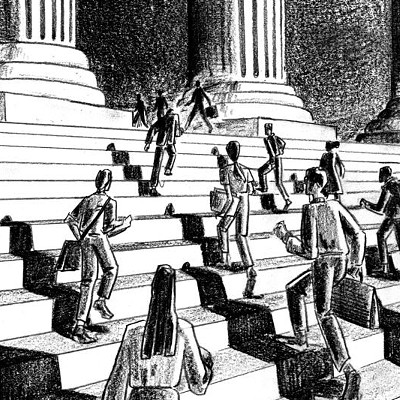"That mine is going to happen regardless," he said. "There's too much money in those mountains for somebody to walk away from."
Few will dispute that Levy knows a tad about making money. After all, he is son-in-law to legendary land speculator Don Diamond. And he did pocket the tidy sum of $16 million from buying Rosemont Valley in the Santa Rita Mountains and flipping it a few months later to a Canadian mining company.
Still, it seems that Levy's prognostications may have gone slightly awry. Not only has a proposal to chew up the biologically rich valley sparked ferocious opposition, but it also occurs against the backdrop of increased scrutiny from a Democratic Congress. That shift has already been felt in Pima County, after District 7 Congressman Raul Grijalva was recently named chair of the House Subcommittee on National Parks, Forests and Public Lands.
In February, Grijalva held a congressional hearing in Tucson to consider the Rosemont mine proposal. But he also tapped that pulpit to pitch a far broader agenda, which includes prohibition of new mining on public land in Pima County. That would essentially short-circuit Rosemont Valley mining plans by the Canadian company, Augusta Resource Corporation. Although Augusta hopes to mine a private in-holding, the use of adjacent U.S. Forest Service property would be needed for support operations.
Grijalva has likewise talked of overhauling the 1872 Mining Law. That antiquated statute, first created to encourage frontier settlement, still allows mineral extraction on public lands without royalties, and makes such mines nearly impossible to stop.
However, the congressman may get beaten to the punch by Rep. Nick Rahall, a West Virginia Democrat and new chairman of the Committee on Resources. Rahall is known as a staunch critic of the mining industry. And he's also expected to introduce a measure overhauling the law to give it more environmental teeth and install royalties.
That's a hefty change from the days of Rahall's committee predecessor, California Republican Rep. Richard Pombo. Defeated in the fall elections, Pombo gained fame for his pro-industry approach and heavy-handed attempts to gut the Endangered Species Act.
By contrast, Rahall says a top goal of his tenure is to "protect those resources which Americans cherish as places to recreate, hunt and fish." That's a tall order, in onerous times. Regardless, the mining industry's free ride may indeed be over. And that could have a profound effect on the future of the Rosemont Valley.
Nor are industry leaders ignorant of these shifts, as they noted at a December convention in Reno, Nev. "Many of the new committee and subcommittee chairmen are not sympathetic to mining, and that's kind of an understatement," said Dan Gerkin, the Nation Mining Association's senior vice president for government affairs, according to an Associated Press dispatch. "We're going to be playing a lot more defense and a lot less offense."
This fact is also acknowledged by Carol Raulston, communications vice president for the National Mining Association. Contacted at her office in Washington, D.C., Raulston tells me the NMA actually "has supported reform of the (1872) law for some time.
"Every three for four years, we try to go back and look at where our position has been and whether it still reflects the state of the industry and the changes that need to be made," she says. "Wer'e in the process of doing that right now."
Still, one man's reform is another man's cursed red tape. For example, "We do believe that the mine-permitting process in the United States ought to be less complicated," Raulston says. "It does take a very long time to permit operations."
On the other hand, the NMA doesn't oppose some form of payment to the federal government for minerals plucked from public lands. "While it might not be called royalties, it would be some kind of package that looks at the fair market value of surface rights, and some other fee-payment schedule that provides a fair return to the state or federal government," she says. "That's something we've advocated for quite some time."
But are such concessions just a way for the industry to taste reality in measured doses? Hard to tell, says Roger Featherstone, Southwest representative for the conservation group Earthworks. Either way, he describes the current reform window as both brief and narrow.
"As far as I can tell, (Rahall's) bill is ready to be dropped (in the hopper) after another hearing in D.C. in May," he says. At most, "I expect we're gong to be see that bill introduced before summer.
"And I think the odds are good in the House that we'll see some action on it. Obviously, without Pombo heading up the committee, it's going to make it to the floor. What happens then is a larger question of how new and improved the Democratic structure is.
"On the one hand, the word from the get-go is that this Congress was going to be cautious about doing anything they don't consider a slam-dunk. On the other hand, they also need to be well-aware that unless they show forward movement--to satisfy their base--they're going to be cast as a 'do-nothing Congress,' and the Republicans will eventually knock them out."
But that's not the only complication. Rahall has pushed similar changes to mining law since the 1990s. And even before Republicans seized Congress in 1994, such reforms always faced a roadblock named Sen. Harry Reid. A notorious mining champion, the Nevada Democrat is now Senate majority leader.
"With Harry Reid in charge, it's a whole different ballgame," Featherstone says. "Reid grew up in a ... mining family in Searchlight, Nev. He's been 'Mr. Miner' for a long time."
Even in the 1990s, says Featherstone, Reid was proposing endless measures to lower environmental controls on mines.
But even if changing that 1872 law hits a snag, observers suggest Grijalva's proposal to withdraw swaths of public lands from mining faces better odds. Still, Raulston of the NMA urges caution. "This country is a big user of metals," she says, "and most of those metals are found on federally owned lands. Today, we're increasingly importing more and more metals to meet our needs."
Meeting those needs is one thing. But freely abusing public lands is something else, says Featherstone. He calls Grijalva's proposed land withdrawal "much more doable" than revamping the 1872 law. "I think it might even be possible to craft a large withdrawal bill that's multi-state."
That could potentially lasso more congressional supporters. Or not. "Of course," says Featherstone, "a larger bill could just give opponents that much of a larger target to shoot at."
And so it seems--despite the protestations of Yoram Levy--that nothing is inevitable in woolly world of hard rock mining.












